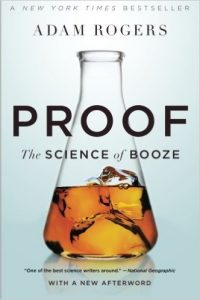 “Proof” is an outstanding book. Neither too short nor too long for its topic, it crisply discusses various elements of the production of (ingestible) alcohol. The author, Adam Rogers, an editor at Wired magazine, writes in a compelling, engaging fashion, including enough science to be interesting and not superficial, without putting in so much science that the average reader gets bored.
“Proof” is an outstanding book. Neither too short nor too long for its topic, it crisply discusses various elements of the production of (ingestible) alcohol. The author, Adam Rogers, an editor at Wired magazine, writes in a compelling, engaging fashion, including enough science to be interesting and not superficial, without putting in so much science that the average reader gets bored.
Rogers discusses in turn every major element of the process. First, he covers yeasts, ranging over their history in the happenstance production of alcohol, through the modern production of specialized yeasts for different processes. Then he discusses sugars, the raw material on which yeasts act, and then fermentation—the process of yeasts acting on sugar. This sounds very technical, and parts of it are. But Rogers manages to smoothly intersperse simplified scientific discussions with anecdotes and conversations with individuals tied to each topic of interest. It all fits together quite well.
“Proof” then moves on to secondary steps in alcohol production: distillation and aging. Rogers ends with ancillary topics: the mostly subjective area of smell and taste, and then the objective, but poorly understood, area of the effect of alcohol on the human body and brain. Finally, Rogers caps off the book with a discussion of hangovers.
Perhaps controversially, Rogers implies that he believes two heresies: that all vodka is the same and therefore perceived taste differences in vodka are delusional, and that much wine appreciation is similarly delusional. As to vodka, I have no idea, although a liquor company executive once told me the same thing and blind taste tests tend to prove delusion as well. Rogers faintly contemptuously points out that vodka has no congeners and is merely pure alcohol, and that while “die-hard vodka drinkers believe that the purest vodkas really do differ in flavor, on its face, that claim doesn’t make sense.” He notes that “one hypothesis for why they don’t says that [water] forms crystalline molecular cages called clathrates, trapping ethanol inside. . . . . [but] it’s not like there are taste buds for hydrogen bond strength.” He never quite comes out and says that perceived vodka differences are fantasy, though.
As to wine, Rogers seems to believe, with long discussion, that most wine perception is purely subjective, although with training, experts can sometimes use the same language to describe the same wines—but they are likely perceiving things differently, even though they are using the same language, and nearly all perceptions of relative quality are purely subjective, both to the person and the situation. Yes, an expert can identify a specific wine—but only one that he is familiar with, in most cases. His own description of an unfamiliar wine will usually vary from the descriptions of others, even when supposedly using a common vocabulary. Rogers notes studies that wine tasters who are given white wines to taste, then the same wine colored red, report wildly different tastes, appropriate for red wines, for the colored white wines. Rogers notes studies that show that no human can actually distinguish more than four flavors or smells blended together, in wine or anything else. He implies that he believes that people like Robert Parker “are essentially making it all up. Or, like some storefront psychics, possibly they think they know what they’re talking about, when in actuality they’ve merely intuited their way into a con.” So this book may enrage the haute vodka or wine drinker.
For the book as a whole, its net effect is something like watching “Modern Marvels” or “How It’s Made,” but in print and in more detail. Of course, if you hate shows like those, you won’t like this book. But if you do, you’ll love this book.
